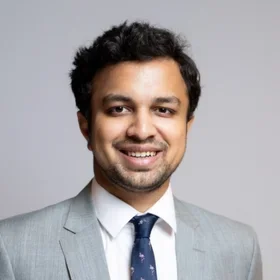Ranked among the top three actuarial science master's programs in the world, the M.S. in Actuarial Science at Columbia University School of Professional Studies (SPS) offers students the opportunity to get mentored by industry leaders as they master essential actuarial skills in industries such as insurance, finance, and risk management.
Alumnus Kyle Cai (’17SPS, Actuarial Science) was one of those students.
We recently spoke with Kyle about his experience in the program. He shared tools and insights that he acquired as an SPS student, the surprising link he learned between actuarial science and storytelling, and how his final project at the program became a major talking point in job interviews.
Tell us a little bit about your current role and how your time at SPS has informed your work.
I’m currently working as a senior data analyst with a healthcare insurer. The analytical mindset and problem-solving skills I picked up as a student in the Actuarial Science program have proved to be critical to my day-to-day work. Several of the classes included projects that involved model building in Excel to apply theories learned in class. Projects like these gave me hands-on experience and, more importantly, a developed approach to similar problems at work.
Is there anything about actuarial science that might surprise someone new to the field?
Actuarial science is more than just understanding how to calculate insurance premiums. It’s a fascinating field that involves diverse applications of math, statistics, finance, and risk management in various fields like pensions, investments, government, and health care to help entities manage financial risks.
Having a rigorous mathematical background is necessary, as the majority of the work relies on complicated analytical models, but being successful in the actuarial science field is not just about number crunching. While accurate results are the basis for analysis, having excellent communication skills is indispensable, as one must be able to convey complex financial concepts and model outputs to non-experts. As my current director once told me: From the model outputs, you must always have a story to tell that ends with a punchline.
What has been your biggest takeaway from the program? Was there a class you loved or skills you gained that you have found particularly useful?
Columbia’s Actuarial Science program not only prepared me for my exams, but also equipped me as a practical problem solver with a rigorous analytical mind.
In addition to the core classes, I found that many of my favorite classes were electives. In the Risk Management in P&C (Property and Casualty) class, we had two professors who were industry leaders in the P&C field. The class not only equipped us with the corresponding industry knowledge but also presented us with actual cases to work through. And the ProSeminar provided me a platform to meet industry leaders and experts in my areas of interest, and gave me countless opportunities to engage with them both during and after seminars to help develop my career network.
Were you involved in a project during your time in the Actuarial Science program that you found particularly meaningful?
Columbia’s brand, New York City’s location, and the program’s rigorous academic requirements all made for a memorable experience, but the integrated project I worked on during summer break really stands out. I had the opportunity to work with Society of Actuaries fellow Rebecca Owen and fellow student Joy Gao on a healthcare issue related to opioid overdoses. The project used publicly available data to examine opioid prescribing patterns and create models to find opioid prescribing outliers.
During the 10-week project, we learned how to apply the analytical skills we had acquired in the program on actual data, build a model using reasonable assumptions, and come up with observations and recommendations. The project ended up being published as a research paper and became one of the highlights and talking points in my job search after graduation.
Views and opinions expressed here are those of the authors, and do not necessarily reflect the official position of Columbia University.
About the Program
The Master of Science in Actuarial Science program at Columbia University is internationally renowned for its breakthrough curriculum and esteemed faculty. The program equips students with the tools, skills, and knowledge to excel in today’s rapidly evolving actuarial and related workplaces, with a course of study designed to anticipate and exceed industry needs. Students are prepared to assume leadership positions and meet ever-expanding opportunities. Columbia’s location in New York City, the financial and actuarial capital of the world, allows students access to the world’s foremost practitioners and leaders.


